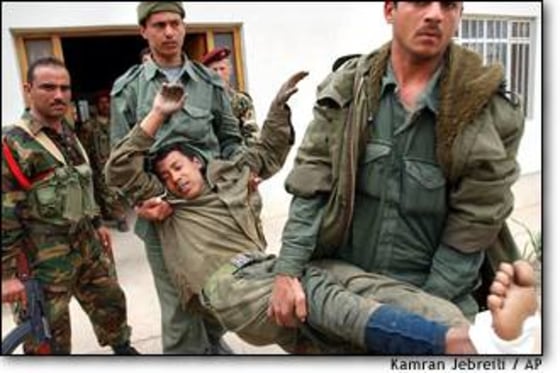When the American bomb fell less than 500 yards away, Sadaq, an officer in Saddam Hussein’s army, knew the time had come. He put down his gun, crawled out of his bunker in northern Iraq and watched carefully for Saddam’s intelligence agents and paramilitaries patrolling the area. Then he deserted.
As the United States begins to throw an armored noose around Baghdad, hoping to choke off the Iraqi capital and eventually rule it, there is a growing feeling in northern Iraq that, as goes Baghdad, so, too, will go the north.
In recent weeks, U.S. special operations forces backed by Kurdish rebel fighters have made small gains against retreating Iraqi troops in northern Iraq. The dual pressures of targeted aerial bombardment and ground strikes have caused many Iraqi army positions to melt away.
At the same time, Kurdish officials say they’ve seen an increase in Iraqi deserters who, faced with the might of the American military, are deciding that Saddam is not worth dying for.
In a brightly lit prison interrogation room in Kurdish-controlled northern Iraq, that assertion had a human face in the person of Sadaq, a 1st lieutenant in Iraq’s 2nd Army Division. Sadaq, who has family in Baghdad, spoke on the condition that his real name not be used.
“The soldiers are realizing the end is near,” he said. “They are summoning all their courage to do what I have done — walk away.”
Sadaq’s comments will be music to the Pentagon’s ears. The northern front in this war never materialized after Turkey refused access to American ground troops.
With just 2,000 U.S. troops on the ground in northern Iraq, no Pentagon plan is expected to send them after the estimated 100,000 Iraqi soldiers based in the region.
But there may be another way out. According to Lt. Sadaq, the arrival of American forces at the gates of Baghdad is convincing Iraqi soldiers to desert.
TO KILL OR BE KILLED
Less than 24 hours after he deserted and was captured by the Kurds, Sadaq sits stiffly in a beige plastic chair at the Kurdish security headquarters in Sulaimaniyah. His demeanor defies the conditions around him. Despite only a few hours sleep in a small jail cell, the creases in Sadaq’s green uniform are still as sharp as a knife’s edge.
A recent graduate of officers’ training school in Baghdad, Sadaq says he was posted to northern Iraq only two weeks before the U.S.-led war against Saddam began.
“The war has been difficult,” he said. “There have been many injuries from the U.S. bombs.” At least in Sadaq’s 400-strong unit of the 2nd Division, however, there have been no deaths.
But the 29-year-old with a ready smile said the American bombs, growing more frequent by the day, are unnerving for soldiers in the field. Privately they are questioning their role in the war, Sadaq said.
“Why should I kill or be killed?” he asked.
In the south, there is evidence that Sadaq’s question is on the minds of other Iraqi troops. American forces heading north toward Baghdad say combat boots are being abandoned by the hundreds in roadside ditches, a sign that Iraqi troops are donning civilian clothes and heading home.
“All we really want is to live a happy life,” he said. “If the Americans can create those conditions, we will welcome them.”
STILL A TRICKLE
The deserters, however, appear to be a trickle rather than a tide, a phenomenon Sadaq attributes to the still omnipresent Iraqi mukhabarat, or state security.
Security agents were always around his division, Sadaq said, especially when American bombs were falling. “They kept us from running away.”
Iraqi officers were also ordered to impose a news blackout on soldiers, who only heard an occasional pro-Saddam broadcast on the radio.
A few officers sneaked in their own radios and secretly listened to other stations, but “we can’t express ourselves truly. Everyone in the military is afraid,” he said.
For the few whose desire to desert trumps their fear, the escape can be harrowing. Sadaq said he made the decision to desert, and waited for the right time.
At 3 p.m. on Saturday, a 2,000-pound American bomb 500 yards away made the decision for Sadaq. He turned to a fellow officer, in whom he confided when they listened to clandestine radio broadcasts, and said the time had come to go back to Baghdad to his family.
In a moment emblematic of the surreal nature of war, Sadaq walked down the road and hailed an orange and white taxi. Another Iraqi, a low-ranking soldier, hopped in the back. “I didn’t know him,” Sadaq says, “but it only took one look for us to realize we were doing the same thing. We never spoke.”
The taxi drove for about 10 minutes. Suddenly, four gunmen jumped into the road and brought the car to a halt. “I thought it was Saddam’s security,” Sadaq said. “I thought it was the end.”
The gunmen turned out to be Kurdish rebel forces who had come within a mile of the Iraqi position. Sadaq and the others in the car put up their hands to surrender. The Kurds say they expect to release Sadaq and other Iraqi troops once Saddam has been toppled.
Although he had not reached his family, Sadaq said he had reached safety — away from the Iraqi military and the war.
(MSNBC.com’s Preston Mendenhall is on assignment in northern Iraq.)
